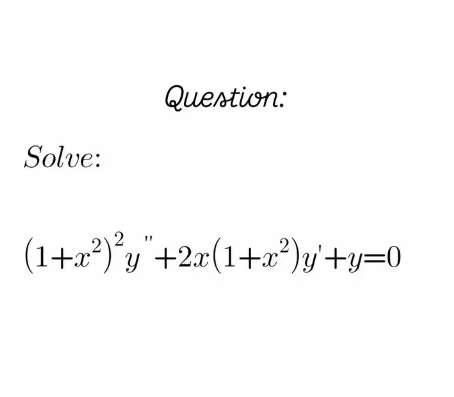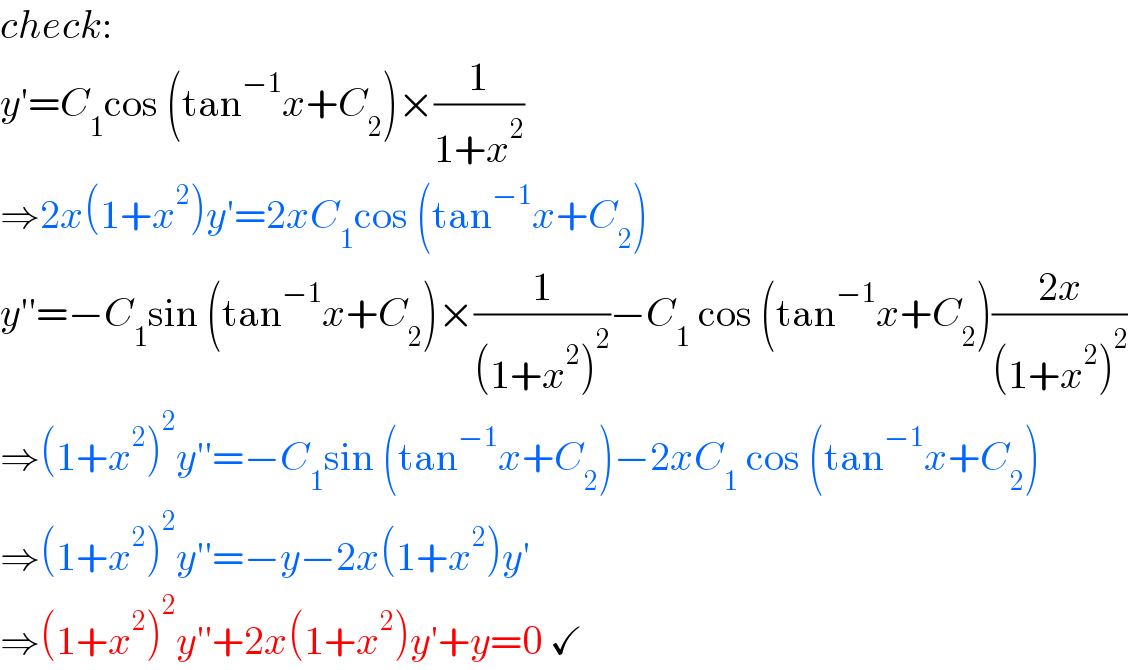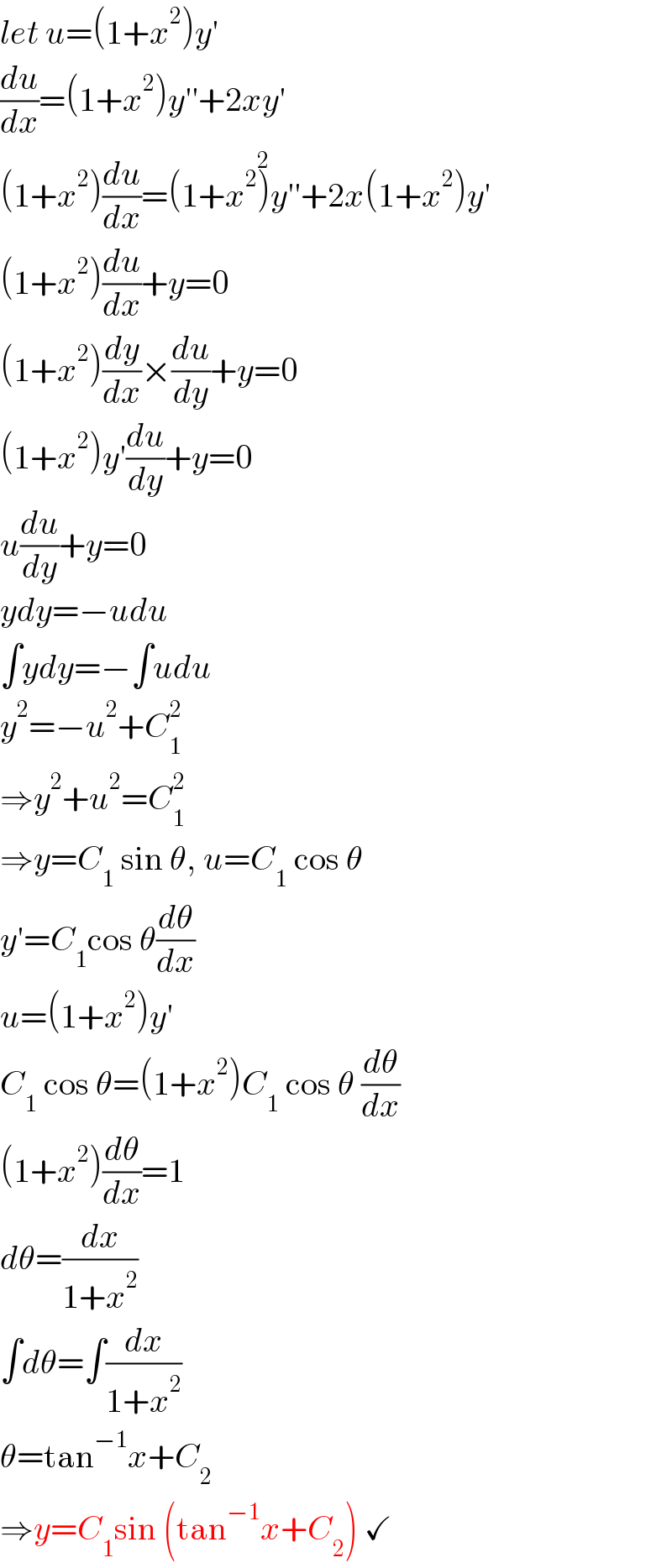
Question Number 219243 by mnjuly1970 last updated on 21/Apr/25

Commented by mr W last updated on 23/Apr/25

$${i}\:{got}\:\left({solution}\:{see}\:{below}\right) \\ $$$${y}={C}_{\mathrm{1}} \mathrm{sin}\:\left(\mathrm{tan}^{−\mathrm{1}} {x}+{C}_{\mathrm{2}} \right) \\ $$
Commented by mr W last updated on 22/Apr/25

$${check}: \\ $$$${y}'={C}_{\mathrm{1}} \mathrm{cos}\:\left(\mathrm{tan}^{−\mathrm{1}} {x}+{C}_{\mathrm{2}} \right)×\frac{\mathrm{1}}{\mathrm{1}+{x}^{\mathrm{2}} } \\ $$$$\Rightarrow\mathrm{2}{x}\left(\mathrm{1}+{x}^{\mathrm{2}} \right){y}'=\mathrm{2}{xC}_{\mathrm{1}} \mathrm{cos}\:\left(\mathrm{tan}^{−\mathrm{1}} {x}+{C}_{\mathrm{2}} \right) \\ $$$${y}''=−{C}_{\mathrm{1}} \mathrm{sin}\:\left(\mathrm{tan}^{−\mathrm{1}} {x}+{C}_{\mathrm{2}} \right)×\frac{\mathrm{1}}{\left(\mathrm{1}+{x}^{\mathrm{2}} \right)^{\mathrm{2}} }−{C}_{\mathrm{1}} \:\mathrm{cos}\:\left(\mathrm{tan}^{−\mathrm{1}} {x}+{C}_{\mathrm{2}} \right)\frac{\mathrm{2}{x}}{\left(\mathrm{1}+{x}^{\mathrm{2}} \right)^{\mathrm{2}} } \\ $$$$\Rightarrow\left(\mathrm{1}+{x}^{\mathrm{2}} \right)^{\mathrm{2}} {y}''=−{C}_{\mathrm{1}} \mathrm{sin}\:\left(\mathrm{tan}^{−\mathrm{1}} {x}+{C}_{\mathrm{2}} \right)−\mathrm{2}{xC}_{\mathrm{1}} \:\mathrm{cos}\:\left(\mathrm{tan}^{−\mathrm{1}} {x}+{C}_{\mathrm{2}} \right) \\ $$$$\Rightarrow\left(\mathrm{1}+{x}^{\mathrm{2}} \right)^{\mathrm{2}} {y}''=−{y}−\mathrm{2}{x}\left(\mathrm{1}+{x}^{\mathrm{2}} \right){y}' \\ $$$$\Rightarrow\left(\mathrm{1}+{x}^{\mathrm{2}} \right)^{\mathrm{2}} {y}''+\mathrm{2}{x}\left(\mathrm{1}+{x}^{\mathrm{2}} \right){y}'+{y}=\mathrm{0}\:\checkmark \\ $$
Answered by MathematicalUser2357 last updated on 21/Apr/25

$${y}=\frac{{x}\sqrt{{x}^{\mathrm{2}} +\mathrm{1}}{C}_{\mathrm{1}} +\sqrt{{x}^{\mathrm{2}} +\mathrm{1}}{C}_{\mathrm{2}} }{{x}^{\mathrm{2}} +\mathrm{1}} \\ $$
Commented by mnjuly1970 last updated on 21/Apr/25

$$\:{thx}\:\:{please}\:{solution}\:{with}\:{details} \\ $$
Commented by MathematicalUser2357 last updated on 22/Apr/25

$$\mathrm{solution}\:\mathrm{with}\:\mathrm{details} \\ $$$$\left(\mathrm{so},\:\mathrm{I}\:\mathrm{can}'\mathrm{t}\:\mathrm{solve}\:\mathrm{by}\:\mathrm{hand},\:\mathrm{so}\:\mathrm{WolframAlpha}\:\mathrm{solved}\:\mathrm{for}\:\mathrm{me}!\right) \\ $$
Answered by Ghisom last updated on 21/Apr/25
![this one is somehow obvious [at least with some experience] multiply the equation with (1+x^2 )^(1/2) (1+x^2 )^(5/2) y′′+2x(1+x^2 )^(3/2) y′+(1+x^2 )^(1/2) y=0 assume y=((ax+b)/( (1+x^2 )^(1/2) )) ⇒ y′=−((bx−a)/((1+x^2 )^(3/2) )) ⇒ y′′=((2bx^2 −3ax−b)/((1+x^2 )^(5/2) )) inserting above ⇒ true](Q219266.png)
$$\mathrm{this}\:\mathrm{one}\:\mathrm{is}\:\mathrm{somehow}\:\mathrm{obvious}\:\left[\mathrm{at}\:\mathrm{least}\:\mathrm{with}\right. \\ $$$$\left.\mathrm{some}\:\mathrm{experience}\right] \\ $$$$\mathrm{multiply}\:\mathrm{the}\:\mathrm{equation}\:\mathrm{with}\:\left(\mathrm{1}+{x}^{\mathrm{2}} \right)^{\mathrm{1}/\mathrm{2}} \\ $$$$\left(\mathrm{1}+{x}^{\mathrm{2}} \right)^{\mathrm{5}/\mathrm{2}} {y}''+\mathrm{2}{x}\left(\mathrm{1}+{x}^{\mathrm{2}} \right)^{\mathrm{3}/\mathrm{2}} {y}'+\left(\mathrm{1}+{x}^{\mathrm{2}} \right)^{\mathrm{1}/\mathrm{2}} {y}=\mathrm{0} \\ $$$$\mathrm{assume}\:{y}=\frac{{ax}+{b}}{\:\left(\mathrm{1}+{x}^{\mathrm{2}} \right)^{\mathrm{1}/\mathrm{2}} } \\ $$$$\Rightarrow\:{y}'=−\frac{{bx}−{a}}{\left(\mathrm{1}+{x}^{\mathrm{2}} \right)^{\mathrm{3}/\mathrm{2}} } \\ $$$$\Rightarrow\:{y}''=\frac{\mathrm{2}{bx}^{\mathrm{2}} −\mathrm{3}{ax}−{b}}{\left(\mathrm{1}+{x}^{\mathrm{2}} \right)^{\mathrm{5}/\mathrm{2}} } \\ $$$$\mathrm{inserting}\:\mathrm{above}\:\Rightarrow\:\mathrm{true} \\ $$
Answered by mr W last updated on 22/Apr/25

$${let}\:{u}=\left(\mathrm{1}+{x}^{\mathrm{2}} \right){y}' \\ $$$$\frac{{du}}{{dx}}=\left(\mathrm{1}+{x}^{\mathrm{2}} \right){y}''+\mathrm{2}{xy}' \\ $$$$\left(\mathrm{1}+{x}^{\mathrm{2}} \right)\frac{{du}}{{dx}}=\left(\mathrm{1}+{x}^{\mathrm{2}} \overset{\mathrm{2}} {\right)}{y}''+\mathrm{2}{x}\left(\mathrm{1}+{x}^{\mathrm{2}} \right){y}' \\ $$$$\left(\mathrm{1}+{x}^{\mathrm{2}} \right)\frac{{du}}{{dx}}+{y}=\mathrm{0} \\ $$$$\left(\mathrm{1}+{x}^{\mathrm{2}} \right)\frac{{dy}}{{dx}}×\frac{{du}}{{dy}}+{y}=\mathrm{0} \\ $$$$\left(\mathrm{1}+{x}^{\mathrm{2}} \right){y}'\frac{{du}}{{dy}}+{y}=\mathrm{0} \\ $$$${u}\frac{{du}}{{dy}}+{y}=\mathrm{0} \\ $$$${ydy}=−{udu} \\ $$$$\int{ydy}=−\int{udu} \\ $$$${y}^{\mathrm{2}} =−{u}^{\mathrm{2}} +{C}_{\mathrm{1}} ^{\mathrm{2}} \\ $$$$\Rightarrow{y}^{\mathrm{2}} +{u}^{\mathrm{2}} ={C}_{\mathrm{1}} ^{\mathrm{2}} \\ $$$$\Rightarrow{y}={C}_{\mathrm{1}} \:\mathrm{sin}\:\theta,\:{u}={C}_{\mathrm{1}} \:\mathrm{cos}\:\theta \\ $$$${y}'={C}_{\mathrm{1}} \mathrm{cos}\:\theta\frac{{d}\theta}{{dx}} \\ $$$${u}=\left(\mathrm{1}+{x}^{\mathrm{2}} \right){y}' \\ $$$${C}_{\mathrm{1}} \:\mathrm{cos}\:\theta=\left(\mathrm{1}+{x}^{\mathrm{2}} \right){C}_{\mathrm{1}} \:\mathrm{cos}\:\theta\:\frac{{d}\theta}{{dx}} \\ $$$$\left(\mathrm{1}+{x}^{\mathrm{2}} \right)\frac{{d}\theta}{{dx}}=\mathrm{1} \\ $$$${d}\theta=\frac{{dx}}{\mathrm{1}+{x}^{\mathrm{2}} } \\ $$$$\int{d}\theta=\int\frac{{dx}}{\mathrm{1}+{x}^{\mathrm{2}} } \\ $$$$\theta=\mathrm{tan}^{−\mathrm{1}} {x}+{C}_{\mathrm{2}} \\ $$$$\Rightarrow{y}={C}_{\mathrm{1}} \mathrm{sin}\:\left(\mathrm{tan}^{−\mathrm{1}} {x}+{C}_{\mathrm{2}} \right)\:\checkmark \\ $$
Commented by mr W last updated on 23/Apr/25
![tan^(−1) x=sin^(−1) (x/( (√(1+x^2 ))))=cos^(−1) (1/( (√(1+x^2 )))) y=C_1 sin (tan^(−1) x+C_2 ) =C_1 [sin (tan^(−1) x) cos C_2 +cos (tan^(−1) x) sin C_2 ] =C_1 [sin (sin^(−1) (x/( (√(1+x^2 ))))) cos C_2 +cos (cos^(−1) (1/( (√(1+x^2 ))))) sin C_2 ] =C_1 [(x/( (√(1+x^2 )))) cos C_2 +(1/( (√(1+x^2 )))) sin C_2 ] =((c_1 x+c_2 )/( (√(1+x^2 )))) that means the result can also be expressed as y=((C_1 x+C_2 )/( (√(1+x^2 )))).](Q219329.png)
$$\mathrm{tan}^{−\mathrm{1}} {x}=\mathrm{sin}^{−\mathrm{1}} \frac{{x}}{\:\sqrt{\mathrm{1}+{x}^{\mathrm{2}} }}=\mathrm{cos}^{−\mathrm{1}} \frac{\mathrm{1}}{\:\sqrt{\mathrm{1}+{x}^{\mathrm{2}} }} \\ $$$${y}={C}_{\mathrm{1}} \mathrm{sin}\:\left(\mathrm{tan}^{−\mathrm{1}} {x}+{C}_{\mathrm{2}} \right) \\ $$$$\:\:\:={C}_{\mathrm{1}} \left[\mathrm{sin}\:\left(\mathrm{tan}^{−\mathrm{1}} {x}\right)\:\mathrm{cos}\:{C}_{\mathrm{2}} +\mathrm{cos}\:\left(\mathrm{tan}^{−\mathrm{1}} {x}\right)\:\mathrm{sin}\:{C}_{\mathrm{2}} \right] \\ $$$$\:\:\:={C}_{\mathrm{1}} \left[\mathrm{sin}\:\left(\mathrm{sin}^{−\mathrm{1}} \frac{{x}}{\:\sqrt{\mathrm{1}+{x}^{\mathrm{2}} }}\right)\:\mathrm{cos}\:{C}_{\mathrm{2}} +\mathrm{cos}\:\left(\mathrm{cos}^{−\mathrm{1}} \frac{\mathrm{1}}{\:\sqrt{\mathrm{1}+{x}^{\mathrm{2}} }}\right)\:\mathrm{sin}\:{C}_{\mathrm{2}} \right] \\ $$$$\:\:\:={C}_{\mathrm{1}} \left[\frac{{x}}{\:\sqrt{\mathrm{1}+{x}^{\mathrm{2}} }}\:\mathrm{cos}\:{C}_{\mathrm{2}} +\frac{\mathrm{1}}{\:\sqrt{\mathrm{1}+{x}^{\mathrm{2}} }}\:\mathrm{sin}\:{C}_{\mathrm{2}} \right] \\ $$$$\:\:\:=\frac{{c}_{\mathrm{1}} {x}+{c}_{\mathrm{2}} }{\:\sqrt{\mathrm{1}+{x}^{\mathrm{2}} }} \\ $$$${that}\:{means}\:{the}\:{result}\:{can}\:{also} \\ $$$${be}\:{expressed}\:{as}\:{y}=\frac{{C}_{\mathrm{1}} {x}+{C}_{\mathrm{2}} }{\:\sqrt{\mathrm{1}+{x}^{\mathrm{2}} }}. \\ $$
Commented by Ghisom last updated on 23/Apr/25

$$\mathrm{nice}! \\ $$
Commented by mnjuly1970 last updated on 23/Apr/25

$${thanks}\:{alot}\:{sir}\:{W} \\ $$
